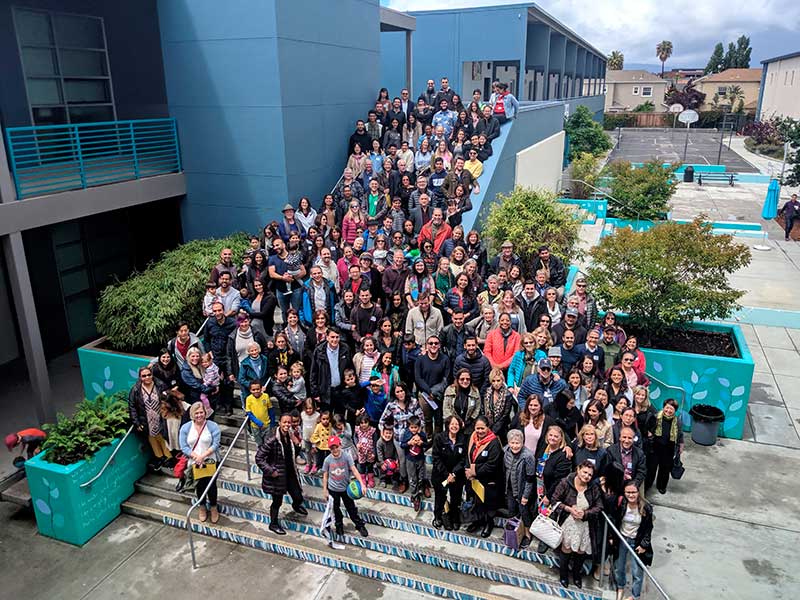
National Baha’i offices’ pandemic response benefits from years of preparation

Many national services to Baha’is and others have continued with barely a hitch since the Baha’i National Organization (BNO) began temporarily closing offices on March 12 in response to the COVID-19 pandemic.
Over 90 percent of all employees in national Baha’i offices across the country are equipped to work remotely after a brief, successful transition, according to Rosemary Cook, BNO human resources director.
This was possible because many business and communication processes have been moved to online tools the past few years.
Soheil Soheil, chief operations officer, says these actions were built on a foundation of years of unified consultation initiated by the National Spiritual Assembly of the Baha’is of the United States.
With such momentum, “we are ready to shift gears quickly” when urgent situations such as the pandemic arise, he says.
Supporting community and administration
As of early April, national and regional offices are keeping up their support for local community building and Baha’i administration at several levels.
Response to public inquiries, communications and social media initiatives, participation in national discourses, defense of Baha’is in countries where the Faith is suppressed, publishing and book distribution, handling of finances, and other services are in full swing.
Videoconferencing tools are helping staff of the Baha’i House of Worship Welcome Center, national centers of learning, and other offices to facilitate devotional and educational events over the internet.
And, of course, they have helped various offices maintain patterns of praying, studying and consulting together to strengthen their work.
The National Assembly, governing council for the U.S. Baha’i community with members in different parts of the country, itself is teleconferencing for its scheduled monthly meetings, the Assembly’s secretary says.
More than 15 years
A lot of the preparations making this coordination possible go back more than 15 years, Soheil says. The National Assembly launched an intensive strategy to strengthen operations in areas such as technology, treasury, communications and human resources to meet the needs of a growing Baha’i community.
Part of the intention was to move a number of tasks then handled nationally to the regional and local levels. Regional Baha’i Councils had been supporting Baha’i community growth and development since 1997, and by now they are established in each of 12 U.S. regions.
Results over the years have included more sophisticated internet communications (with reduced reliance on National Center mailings), electronic means for Baha’is to contribute funds, and remote employee access to email and payroll functions, to name a few.
This has also helped employees gain greater flexibility in working from home. “There are some offices who have members already set up to work from home, even though they normally come to the office,” Cook says. Their experience helped build knowledge about dealing with potential technical hurdles, and “a lot of people were able to not miss a beat when this came about.”
Other thought processes at the BNO over the years have also contributed to this degree of preparation. During the financial crisis late in the previous decade, the national treasurer oversaw an effort to clarify the top-priority actions the national offices need to maintain in the face of severe tests, Soheil notes.
A growing culture of communication and reflection fostered the past few years among the BNO’s dozens of offices has likely bolstered a spirit of unity and cohesiveness in the transition.
Additionally, the past three years have seen a refreshed focus on emergency planning, and “there were some things already in place,” Cook says. One of those is a phone-text alert system that has been used to inform BNO staff members of urgent decisions and developments.
Readiness to act quickly
Thus, early this March as the pandemic began advancing rapidly, the organization had a lot of knowledge and capacity to draw on. The National Assembly knew it needed to act quickly to support the slowing of the virus’ spread.
In the space of a few days, decisions were announced to close — for at least a few weeks — national office buildings in the Chicago area, the Baha’i House of Worship in Wilmette, all permanent Baha’i schools and institutes, and other nationally owned Baha’i properties. Most planned gatherings, including the annual Bahá’í National Convention and events scheduled at the schools, were canceled or postponed through the end of May.
This process of decision started before the state of Illinois and most other affected states issued formal stay-at-home directives.
A few employees have had to keep working in office buildings or at least visit from time to time. The Public Safety team needs to monitor security. Properties must be checked. Mail has to be collected and organized. Fund contributions mailed by the Baha’is have to be recorded and deposited.
Limited access to the buildings in Evanston and Wilmette is being coordinated to prevent direct contact. Since before the buildings were closed, stations with sanitizing liquid and wipes have been placed at each door.
The national operations team is conferring daily so that it can respond quickly to any changing situations and needs, in consultation with the National Assembly secretary.
Human Resources staff members have been making check-in calls to a few BNO employees each day “just to say, ‘Hey, how are you doing, how are you feeling? Do you need anything? Do you need to talk?’ … It’s so important to keep people connected,” Cook says.
Through it all, she emphasizes, the national offices will be learning lessons they won’t want to lose. “Once we can go back to the offices, it will be interesting to see how these conversations continue,” she says. “We’ll have a lot to reflect on.”





